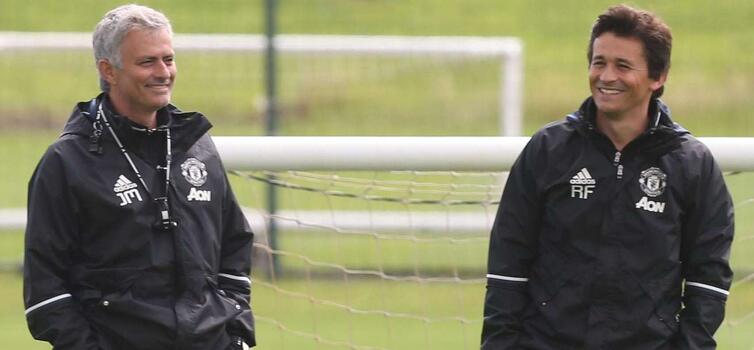Rui Faria: Why I scrapped GPS at Manchester United

Mourinho and Faria won 23 major trophies during their 17-year partnership
Written by Simon Austin — October 3, 2022
RUI FARIA has explained why he decided to scrap the use of GPS at Manchester United.
As TGG revealed at the time, United were the only Premier League side not to use the technology during Faria's time as Jose Mourinho's assistant at the club, from May 2016 to the end of 2017/18.
The decision to do away with GPS was met with incredulity in some quarters because, in the words of one practitioner, GPS vests have become “as much a part of the modern player’s kit as boots and shin pads.”
Players wear the units in both training and matches, with physical data transmitted via a satellite signal.
Speaking on the TGG Podcast, Faria, who won 23 major trophies with Mourinho during their 17 years together, was defiant about his decision.
“First of all, I have nothing against GPS,” the 47-year-old said, “but you cannot reduce performance to GPS. Today, GPS is a good tool, especially if you don’t understand anything about the physiology of the game.
“There is a huge tendency to have GPS controlling the sessions. You have sessions where sport scientists go on the pitch and stop the coach from coaching, because the numbers are going over the numbers they have as a reference.
“This is so ridiculous that everyone is losing the logic of coaching. At that moment we felt it was good for us not to use it. We knew things that had happened in the club in the past, so the decision came from that. Also, it was a tool we felt we didn’t need to use because of our experience and knowledge of the game.
“We have the knowledge of the physiology of the game and are not so worried if a guy today did a percentage of high-intensity (runs) or not. Because the way we prepared the session, that will come up, I don’t need to measure it.
“I have nothing against GPS if it is used in the right way, but people reduce sport science to numbers and sport science is much more than numbers. You are a very bad coach if you are not able to see if a player is training well or not, if he is giving everything or not. If you don’t have those skills as a coach it is better to give up.”
Faria admitted he had used GPS at some points in his career, but decided not to do so at United.
“Can I use it? Yes of course I can. There is a lot of valid information if I get the context. If I find that the information coming from the GPS can be used in a way (in which) I am not interested - and that information is not in my hands - I prefer not to use it, because the benefits will be higher if I don’t.
“Again, I have nothing against sport science if you know how to behave in the context, but that doesn’t always happen. I have a background in sport science, so I am entitled to speak about this. When I say I didn’t use GPS, it’s not because I am old-fashioned, like someone said.
“There are teams putting the results after the training session on the board so you make a competition about who is running more. But before you say who is running more, it is more important to say if you are running well.
“Many times, teams who have the most running are the ones that are chasing the ball. Numbers don’t explain everything. What are we here speaking about, athletics or football? The emotions are not in the numbers and we are human beings.
“Football players have emotions and they (their emotions) control everything. You will perform better if you are in a positive state of mind than if you are in a negative state of mind.”
Faria said the decision to do away with the tech was vindicated by United’s injury record during the period he was at the club.
“The numbers are there, they belong to the Premier League,” he said. "Just go and see the results from 2016 to 2018, where you see the availability of the players and then the ratio in relation with injuries and you have the best numbers - and without GPS.”
The Portuguese, who worked with Mourinho at Uniao de Lairia, Porto, Chelsea, Inter Milan, Real Madrid and Manchester United, said context was also vital when measuring fatigue.
“We had a certain period when there was a player in our team trying to beat the record of matches he did consecutively,” he said. “Someone came to me from the sport science side, saying, ‘Look, the fatigue tests are saying the player is under fatigue, it is a big risk for him to play.’
“I said, ‘Ok, let the player know and let the coach know about it.’ (I was) joking about it, because one, it was impossible to take the player out from the context of where he was.
“Ok, I believe he was showing signs of fatigue, but he played, he never got injured. You can have that information, but you can NEVER say a player cannot play because, 'I found out he is in fatigue.' Come on, this is ridiculous.
"Most of players in the Premier League arrive at the beginning of the season in fatigue. If you go now, there are players in fatigue. What are you going to do, stop them?
“You need to manage, of course. This is why you rotate players. That is why, as a manager, if you have that information in your hand (it) is good, but don’t use it in a way where it becomes a rule - ‘ok, he is in fatigue, we take him out.’”






-1.png)





